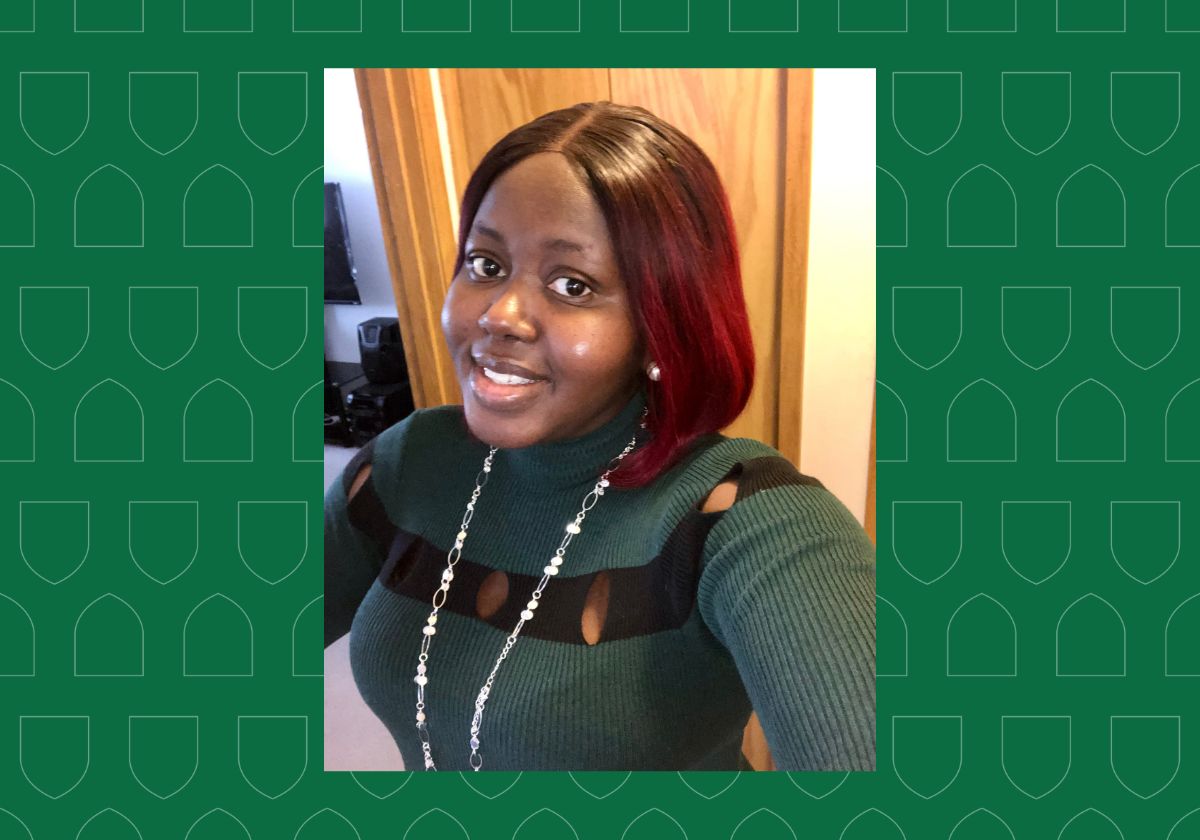
‘Truly memorable’: New USask alumni reflect on their academic journeys
Spring Convocation ceremonies will be held from June 3 – 7 at Merlis Belsher Place
By SHANNON BOKLASCHUKThe University of Saskatchewan (USask) will hold its Spring Convocation ceremonies from June 3 – 7, 2024, at Merlis Belsher Place. A total of 3,623 students will receive 3,835 degrees, certificates, and diplomas, joining a community of more than 171,000 USask alumni worldwide.
In advance of Convocation, the Green&White asked five new USask alumni about their experiences as undergraduate students and about their advice for students who are just beginning their learning journeys.
Damilola (Dammy) Stephen, College of Nursing
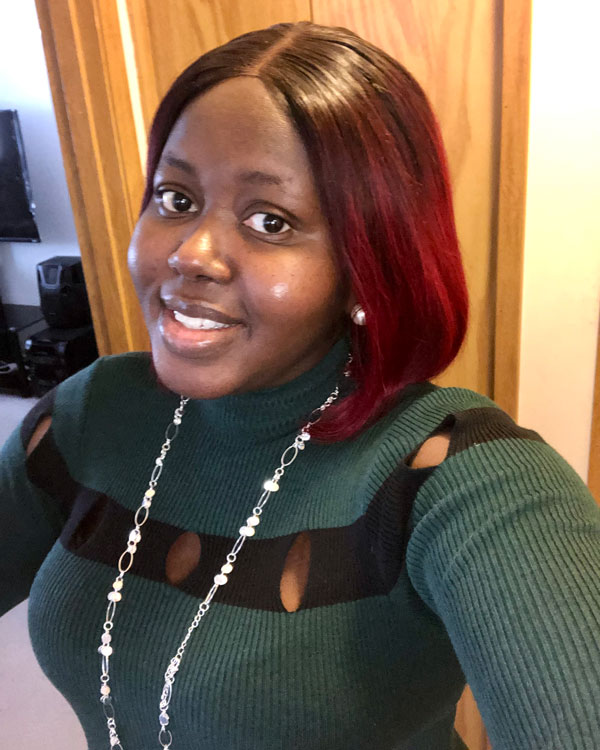
Dammy Stephen was born and raised in Lagos, Nigeria. She will receive her Bachelor of Science in Nursing degree during Spring Convocation.
Why did you choose to study nursing?
My passion for helping people led me to pursue a career in nursing. Providing care gives me a profound sense of purpose and satisfaction, and nursing allows me to achieve this in the most impactful way.
What was your experience like in the College of Nursing?
I had my ups and downs, as navigating being a mom, wife, and student presented its challenges and tested my mental health. However, with the unwavering support of the school and some of my professors and husband, I found the strength and will to continue. Honestly, it’s a mix of emotions; I had enjoyable days and moments of doubt. However, reflecting on my journey, it was worth every struggle.
What is your favourite memory from your time as a USask student?
My favourite memory would be the wonderful and genuine connections I made with instructors, professors, and peers. These relationships significantly enriched my overall experience, making my time at USask truly memorable.
What advice do you have for new students who are just beginning their studies at USask?
Actively engage with the university community. Build connections with your instructors and peers, as these relationships can greatly enhance your academic and personal growth. Take advantage of the resources available, especially if you are having mental health challenges; they were put in place because the school knows you need them, and don’t hesitate to seek help when needed. Embrace the opportunities and challenges and enjoy the journey of learning and self-discovery.
What are your plans now that you have completed your degree?
Start working as an RN (registered nurse) and, most importantly, find my niche. I intend to do some volunteer work in geriatrics and continue on a path of self-discovery.
Saanvi Mital, College of Kinesiology
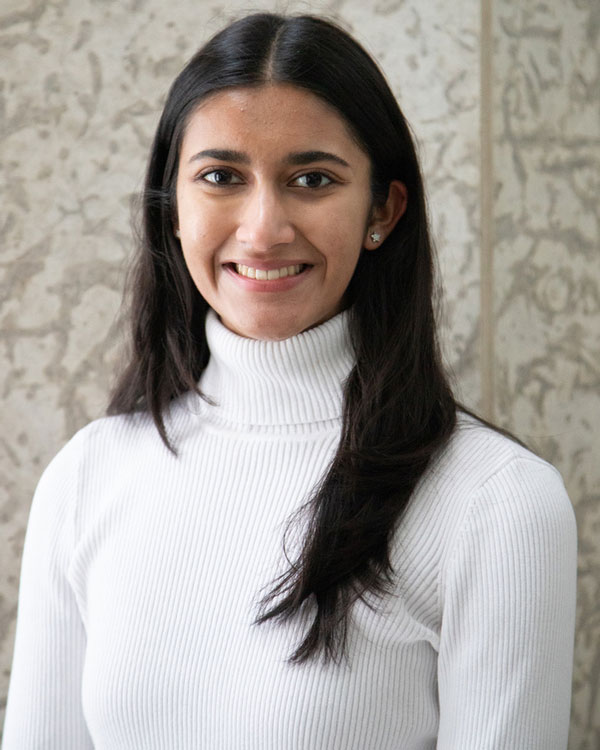
Saanvi Mital was born and raised in Edmonton, Alta. She will receive her Bachelor of Science in Kinesiology degree during Spring Convocation and will be honoured with the Gordon Garvie Prize in Kinesiology, presented to the college’s most outstanding graduate.
Why did you choose to study at the University of Saskatchewan?
Growing up, I always heard my dad speak fondly about his time spent at the University of Saskatchewan. He really found a sense of community here, and the size of the campus made it feel like an easier transition from high school. This turned out to be a great fit for me, as I was able to find that community on campus, while also still having access to the opportunities afforded to a top U15 school in Canada.
What was the best part of studying in the College of Kinesiology?
There are a lot of wonderful parts to the College of Kinesiology, but something that I have really appreciated in my time has been the size of the college. It is a tight-knit community, but there are still many opportunities to get involved in a meaningful way. It has been an absolute privilege to work with our college’s faculty and staff, as they are truly committed to creating the best student experience possible.
Were you involved in any extracurricular activities during your time at USask?
I was involved in many extracurricular experiences throughout my time in undergrad, especially once classes started back up in person (after the COVID-19 pandemic). Something that I really enjoyed doing in the larger campus community was being a physics Structured Study Sessions peer mentor. Since this is a resource that I used when I was taking the course, it was very rewarding to be able to give back and help out others taking the class. I am also grateful for the opportunity to be involved in two wonderful labs in my undergraduate experience. The first lab I worked in was with Dr. Markus Brinkmann and Dr. Kerry McPhedran, where we looked at COVID-19 levels in seven university dormitories through wastewater testing. Later on I was involved as a summer student in Dr. Michelle Collins’ lab, where I worked on two separate projects researching cardiac arrhythmias in zebrafish. In the community, I was able to pursue my passion for sport as I coached junior girls’ volleyball at Marion Graham Collegiate. I was also fortunate to have many extracurricular experiences through the College of Kinesiology. Some notable experiences were being a part of KinLife, Orange You Ready?, multiple hiring committees, and the Kinesiology Students’ Society (KiSS). Through KiSS, I first started as a social representative, then treasurer, and was the president this past year. This meant that I spoke each month at our faculty council meetings, where I really found my voice and grew as a confident leader.
This isn’t necessarily an extracurricular activity, but a class I took during my undergrad that was of particular influence for me was the student trainer practicum. In this course, I was involved as a student trainer with the wrestling team and had the opportunity to work within an integrated support team and practice hands-on skills in the sports medicine field.
What advice do you have for new students who are just beginning their studies at USask?
My advice to new students would be to reach out to older students in their programs to find mentors. University can feel like a very large and daunting place at first, but having a mentor to lean on and a small community to support you makes all the difference in having a more enjoyable and immersive university experience. I am immensely thankful for the mentors I found in both upper years, faculty, and staff, who helped shape my university experience.
What are your plans now that you have completed your degree?
I will be attending medical school at the University of Western Ontario in August.
Emily Holmes, Western College of Veterinary Medicine (WCVM)
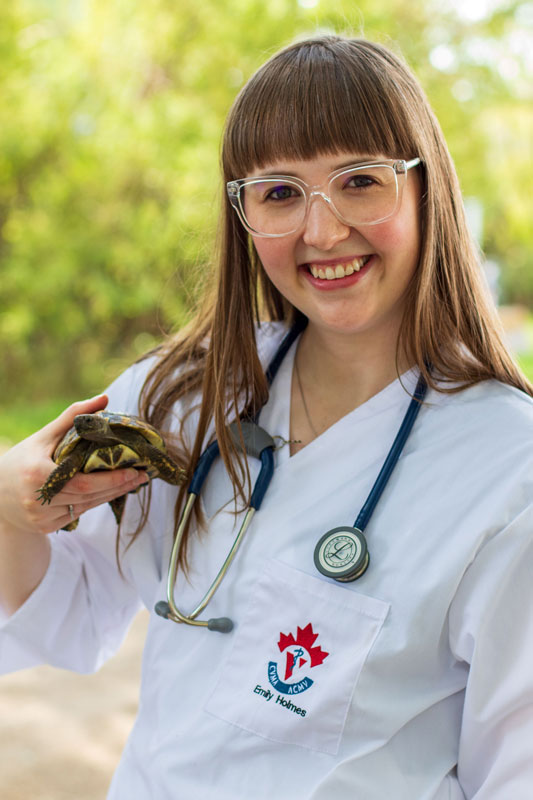
Emily Holmes was born in Kelowna, B.C., and raised in Nanaimo, B.C. She will receive her Doctor of Veterinary Medicine degree during Spring Convocation.
Why did you choose to study at the University of Saskatchewan?
Knowing that WCVM is the vet school for B.C. students, I always hoped I would end up at USask. I did my first two years of undergraduate studies at the University of Northern British Columbia and then transferred to USask. I hadn’t gotten into vet school yet, but just wanted to be on campus where the vet school was and to be able to make connections in Saskatoon. My dad had road-tripped with me out to tour USask and the WCVM in the fall of 2015, when I was in Grade 12, and I really fell in love with the campus—so that also made me excited to transfer.
What was the best part of studying in the Western College of Veterinary Medicine?
The people I met, and the sense of camaraderie, were the best parts of studying at the WCVM. For me it was an incredible feeling to be in a school where everyone has the same profound love of animals; it really gave such a sense of belonging. Getting to meet so many people—both students and instructors— from different backgrounds, who have all ended up at the WCVM because they want to dedicate their lives to animals, is such a unique experience and creates such a remarkable community within the school.
Were you involved in any extracurricular activities during your time at USask?
I did lots of volunteering, fostering, and part-time work for SCAT Street Cat Rescue, so that took up most of what little spare time I had outside of classes and studying. Before getting accepted into the WCVM I was a part of the Pre-Vet Club, which I enjoyed very much.
What is your favourite memory from your time as a USask student?
I loved my rotation in major surgery at the WCVM Small Animal Clinic during my fourth year, and volunteering at a spay-and-neuter clinic in La Ronge, Sask. My fondest memories, though, are of days spent in the WCVM library with close friends, trying to cram an impossible amount of information into our heads. Those days were long and exhausting but will always make me smile over our excitement to become vets and just to think about how far we have come since then.
What advice do you have for new students who are just beginning their studies at USask?
My best advice is to remember that classes are just classes. Take whatever you can from them and do your best—but, at the end of the day, the marks you get won’t dictate your future. I barely passed the first-year veterinary anatomy course, and yet I did well in my fourth-year practical rotations and love surgery (an anatomy-heavy branch of medicine). Don’t let your past experiences limit your future experiences.
What are your plans now that you have completed your degree?
I’m working at North Island Veterinary Hospital—a small animal practice in Port Hardy, B.C. My husband and I are so happy to be home on Northern Vancouver Island with our cats and dog. I enjoy treating cats, dogs, exotic pets (like rabbits, guinea pigs, rats, reptiles, and amphibians), and occasional wildlife patients or large animals, too. Our clinic is somewhat remote, so I enjoy the variety that we get to treat. I am interested in surgery, behaviour medicine, and general wellness medicine—especially for at-risk animals.
Kelsey Acton, College of Agriculture and Bioresources
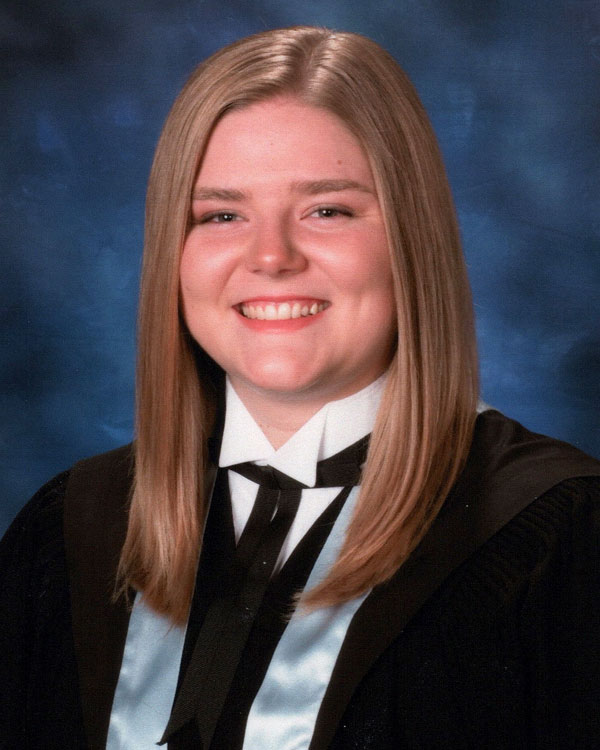
Kelsey Acton was born and raised in Ogema, Sask. Throughout her academic journey at USask, she received numerous scholarships, including the USask Chancellors’ Scholarship and the Torvald and Margaret Tollefson Renewable Entrance Scholarship, and was on the Dean’s List during her four years as a full-time student. She will receive her Bachelor of Science in Agriculture degree, with a major in soil science, during Spring Convocation.
Why did you choose to study at the University of Saskatchewan?
Both of my parents attended the College of Agriculture and Bioresources and, knowing that I wanted to enter the agriculture industry, AgBio was the obvious choice.
What was the best part of studying in the College of Agriculture and Bioresources?
The best part about the College of Agriculture and Bioresources is the people. The community of faculty, staff, and students all contribute to an incredible environment of learning, teaching, and collaboration.
Were you involved in any extracurricular activities during your time at USask?
I was a part of several student clubs, including the USask Range Team, the USask Horticulture Club, and the Environmental and Bioresources Students Association (EBSA). I also played rec sports, like innertube water polo, innertube basketball, and volleyball.
What is your favourite memory from your time as a USask student?
One of my favourite memories from my time as a USask student was taking the SLSC 480 forest soils field course. Growing up in southern Saskatchewan, it was an incredible experience for me to be able to see the wildlife, flora, and soils of our northern forests firsthand. I also had an incredible experience while completing my undergraduate thesis project under Dr. Katherine Stewart. In this project, we transplanted shredded arctic turf as a method of restoration. This opportunity gave me an introduction into research projects, laboratory work, and the fundamentals of restoration.
What advice do you have for new students who are just beginning their studies at USask?
Ask questions. The people at USask are there to help you along every step of your journey, but you must take the first step and ask for assistance when you need it.
What are your plans now that you have completed your degree?
I really enjoyed the research opportunities I had throughout my degree and want to continue into a career in research. Currently, I am working as a contracted research associate for Bayer Crop Science out of Saskatoon. I am also planning to pursue a master’s in soil science at USask.
Muhammad Saif Ullah Amir, College of Arts and Science
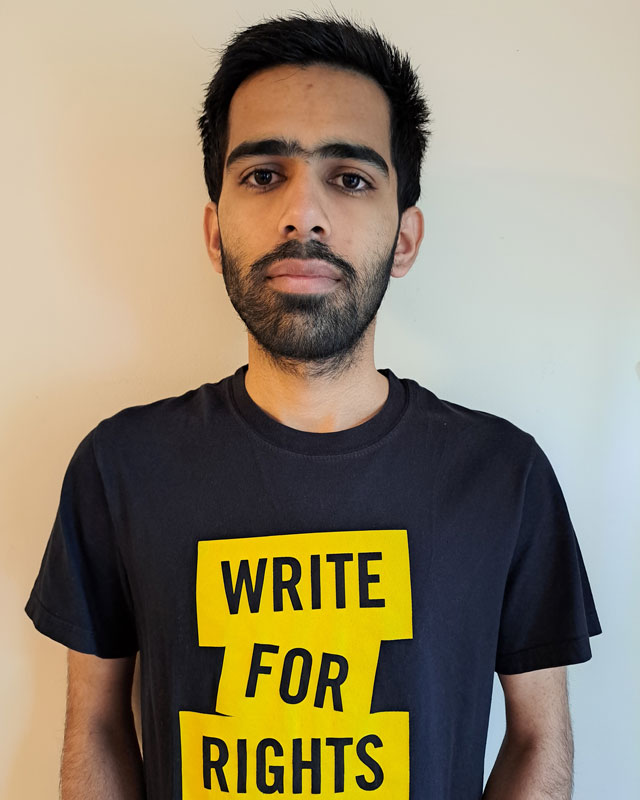
Muhammad Saif Ullah Amir was born in Pakistan and immigrated to Saskatoon with his family at the age of 10. He attended elementary and high school in Saskatoon, graduating from Walter Murray Collegiate before beginning his studies at USask. He has earned numerous scholarships, awards, and honours throughout his time in the College of Arts and Science and will receive his Bachelor of Arts (honours) degree in sociology during Spring Convocation, as well as a Certificate in Global Studies and a Certificate in Indigenous Governance and Politics.
Why did you choose to study at the University of Saskatchewan?
I chose to attend the University of Saskatchewan as it is located in my home city and my sister is also a USask student.
Why did you choose to study sociology?
I chose sociology because I wanted to investigate social issues and better understand our social world. Sociology covers a wide variety of topics, so I was able to take classes that dealt with different aspects of our society, such as family, the criminal justice system, and law. I highly enjoyed my sociology classes as they were the place where we discussed contemporary issues—for example, addictions, reconciliation, social/economic inequality—as well as explored potential solutions. The certificates relate to some of my other interests, like globalization, politics, and human rights.
What was your experience like in the College of Arts and Science?
I had a really nice experience in the College of Arts and Science. As Arts and Science students, we are able to choose from a variety of majors/minors/certificates, which encouraged me to pursue certificates alongside my major. Additionally, I was able to learn from professors who are highly knowledgeable and respected in their fields. Furthermore, I found the undergraduate academic advisors to be very helpful and supportive.
Were you involved in any extracurricular activities during your time at USask?
Yes—the University of Saskatchewan Undergraduate Research Journal (USURJ), the Student Undergraduate Research Experience (SURE), and Peer Health.
What is your favourite memory from your time as a USask student?
Two favourite memories as a USask student: 1) Preparing a report for a community partner (United Way of Saskatoon & Area) as part of my undergraduate thesis course (SOC 410). I and other students worked as a team to analyze 211 Saskatchewan’s call data and offer some conclusions. 2) Creating an Empathy Game in POLS 201. Students created computer and board games that were designed to bring attention to global issues, like climate change and conflict. The goal was that by playing each other’s games, students will develop empathy for people who are experiencing injustices. These two memories highlight that courses offered in the College of Arts and Science equip students with skills/knowledge that they can use to serve their local communities and the world.
What advice do you have for new students who are just beginning their studies at USask?
My advice to new USask students is that you should join the various campus groups, as they allow you to meet like-minded people and create a sense of community. I would also say to new students try to use all the resources that the university offers, like the Writing Help Centre or Career Services, as they are free of charge and really helpful for professional development.
What are your plans now that you have completed your degree?
If everything goes as planned, I will start the master’s program at the University of Ottawa in September 2024. My hope is that after the MA, I can work in a public or private institution that is involved in policy-making or research.
Is there anything else that you would like to add?
I really wanted to thank the following professors for their continuous support: Dr. Harley Dickinson (Department of Sociology), Dr. Timothy Kang (Department of Sociology), Dr. Martin Gaal (Department of Political Studies), and Dr. Barb Fornssler (School of Public Health).
Together we will support and inspire students to succeed. We invite you to join by supporting current and future students' needs at USask.

